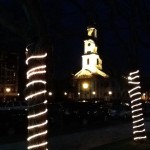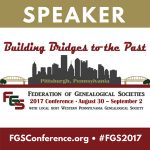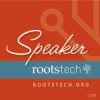The current GeneaBloggers discussion on Genea-Opportunities (Let’s Make Lots of Money) couldn’t be more timely. I have just returned home from the New England Regional Genealogical Conference (NERGC) in Springfield, Mass. and a week of extended ancestor hunting across the Green Mountains of Vermont. In those ten days I met every kind of genealogist and had my eyes opened to “how they do it” in New England.
Like most conferences, this one attracted a good mix of family historians and professional genealogists. Not surprisingly, when presenters queried their audience in a session, there were relatively few who admitted to “beginner” status. After all, New England researchers have been at this endeavor a very long time. So, if most attendees seemed to NOT be beginners, where did they stand? Of the people I met, I would say that most were serious, experienced, genealogists, even though they may not be making money at their craft.
I attended the evening Special Interest Session with Elissa Scalise Powell, “Becoming a Professional Genealogist” where the group of 25 or 30 asked pointed questions about the certification process and value of professional status. I faded with jet-lag before the end of the 90-minute session but didn’t hear any questions at all on “how to make a living” as genealogist. The assumption was that clients means “paying” clients. There was no devaluation of the desire to achieve this goal.
In fact, Yankees have a noted affinity for frugality and resourcefulness. It only makes sense that a room of New Englanders would be interested in turning a honing a talent for research into a paying occupation or avocation. I spoke with some attendees who were doing pro bono research and wanted to have the qualifications to justify a fair fee for their services.
But it wasn’t all about the money, either. One of the most popular features at NERGC was the Ancestor Road Show — two days of free twenty-minute one-on-one consultations with professional genealogists. I thought I could sign up on site, but really missed out. Although there were nearly 40 genealogists (12 CG) making appointments, the sessions all filled up quickly.
What does all this say about the New England genealogists I observed at NERGC? It tells me that they see professional status as a Board Certified Genealogists as a valuable and helpful skill for anyone wanting to make an income as a genealogist. In addition, it showed that one doesn’t need to be CG to be a professional, i.e. earning an income from paying clients.






I have to agree, Polly, that technology has increased the pace of research dramatically. And yes, fancy computer databases mean nothing without good research.
I didn't see NERGC as negligent by not offering more tech courses; as Midge noted, maybe there just isn't the interest right now… but in two years, there may be.
Actually, I found the emphasis on sharing expertise very helpful. There is only so much time in a conference schedule, and I learned a great deal from the presenters.
Interesting impressions, Denise. There may people calling themselves professionals who don't use any technology, but I have to say they can't be very inefficient and I wouldn't want to be paying them! The web has speeded (sped?) things up to a point where you're negligent if you don't use it, IMO. Having said that, there are all kinds of people who come under the professional umbrella, and it could be that someone writing an article that meets professional standards has the luxury of taking five years to complete it, using old fashioned methods. On the other hand, using all of the bells and whistles of technology doesn't mean anything if there isn't a solid standards-driven background to all research. They go hand in hand. It's not easy to plug everyone into boxes, and most of it will improve with education through conferences like NERGC. NERGC was probably negligent on the technology aspect this time, but that is sure to change. Given all of the tension in the blogger community we can only hope that everyone remains patient with one another while we study the benefits and hazards of following one narrow path. Hopefully, growth will ensue on all sides!
That's an interesting distinction, Midge. Those folks are missing a lot of advances that I find make research more fun. I was surprised to hear pros confess, rather proudly, that they didn't use genealogy software at all, preferring all hand-typed notes. I can't imagine trying to make sense of my ramblings without a database.
Do you think t here would me much interest in a technology track at NERGC? Could be an interesting thought.
And I was so happy to meet you at last, cousin.
Yes, we've been doing this a long time but I have learned in the last 8 years that many New Englanders who belong to societies or go to conferences do not do active research. They have charts and scrapbooks made by two or more generations back. They don't use the Internet, share any data, or use computer software.
I wonder how many have things that will be destroyed upon their deaths? Some have told me about their (unproven) Mayflower and Revolutionary lines. They mean well but are happy with their 15 gen handwritten charts. They complain that they have to pay to listen to speakers. It is sad.
We were glad to have you, California girl with New England roots…